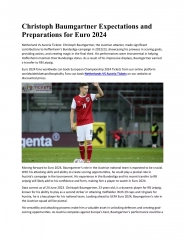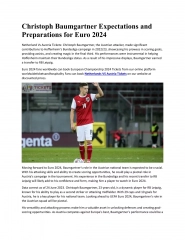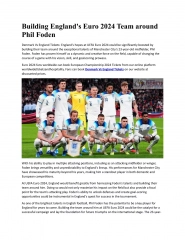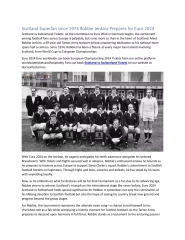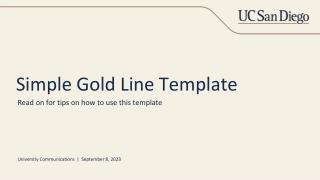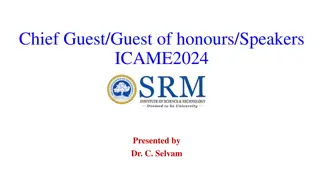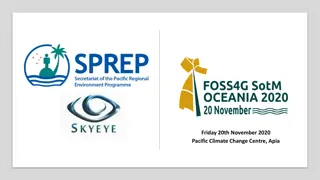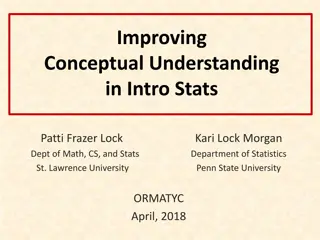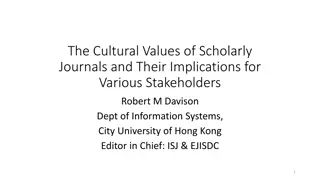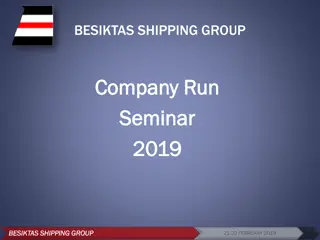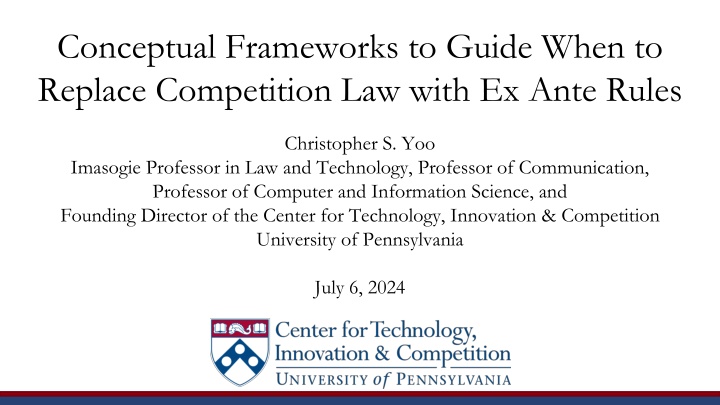
Replace Competition Law with Ex Ante Rules: Conceptual Frameworks by Christopher S. Yoo
Explore when to replace competition law with ex ante rules through the insightful analysis provided by Christopher S. Yoo in this comprehensive study. It covers antitrust, regulations, institutional considerations, and potential applications, shedding light on the complex interplay between competition law and ex ante decision-making in the modern legal landscape.
Download Presentation

Please find below an Image/Link to download the presentation.
The content on the website is provided AS IS for your information and personal use only. It may not be sold, licensed, or shared on other websites without obtaining consent from the author. If you encounter any issues during the download, it is possible that the publisher has removed the file from their server.
You are allowed to download the files provided on this website for personal or commercial use, subject to the condition that they are used lawfully. All files are the property of their respective owners.
The content on the website is provided AS IS for your information and personal use only. It may not be sold, licensed, or shared on other websites without obtaining consent from the author.
E N D
Presentation Transcript
Conceptual Frameworks to Guide When to Replace Competition Law with Ex Ante Rules Christopher S. Yoo Imasogie Professor in Law and Technology, Professor of Communication, Professor of Computer and Information Science, and Founding Director of the Center for Technology, Innovation & Competition University of Pennsylvania July 6, 2024
Overview Antitrust and regulation as substitutes or complements Rationales for preferring ex ante over ex post decisionmaking Substantive considerations Institutional considerations Potential applications
Antitrust and Regulation as Substitutes or Complements 4
Antitrust and Regulation as Complements Regulatory failure claims in the U.S. breakup of AT&T (D.D.C. 1982) EU margin squeeze cases Deutsche Telekom (ECJ 2003) Telef nica (ECJ 2014) 5
Antitrust and Regulation as Substitutes 1980s/90s European law U.S. law Federalism: state action immunity and abstention Primary jurisdiction Substantive monopolization law Trinko (U.S. 2004); Credit Suisse (U.S. 2007): general framework linkLine (U.S. 2009): rejection of margin squeezes 6
Reasons for Treating Regimes as Substitutes Enforcement economy (preference for one good resolution) Avoidance of forum shopping and conflicting judgments Differences in institutional competence Discomfort of courts finding that regulation has failed Political decision to displace competition with regulation Natural monopoly as a conceptual limit to utility regulation Impact of successful utility regulation on incentives to enter Implicit surrender to the monopoly 7
Reasons for Treating Regimes as Complements Lack of provisions of regulatory regime performing antitrust functions Ineffectiveness of regulation in application (problematic) Implicit limiting principles Need for clear expression of state policy Need for comprehensive regulatory scheme Need for active oversight 8
Example: Trinko v. Verizon (U.S. 2005) Rivals obtained monetary and injunctive relief from federal and state regulators in March 2000 Law firm customer of rival brought antitrust suit based on same conduct the next day U.S. Supreme Court upheld dismissal of suit Limited benefit from recognizing antitrust liability given alternative avenue for relief Danger of deterring investment in new network capacity 9
Example: Trinko v. Verizon (U.S. 2005) Institutional considerations Difficulty when the means of illicit exclusion, like the means of legitimate competition, are myriad Challenge when disputes are highly technical and subject to incessant, complex, and constantlychanging interaction[s] Antitrust courts lack of institutional capability to perform day-to-day supervisory functions of technical matters Minimal benefits of adding a second layer of litigation when regulatory oversight is adequate 10
Rationales for Preferring Ex Ante over Ex Post Decisionmaking 11
Frameworks for Ex Ante over Ex Post Per se illegality vs. rule of reason Default is rule of reason Per se illegality makes sense for practices so pernicious/lacking in redeeming value that nothing would be lost by banning them Per se illegality is appropriate when: Policy inferences are clear (e.g., abandonment of per se illegality for vertical contractual restraints) Enforcers have experience/familiarity with the practice 12
Frameworks for Ex Ante over Ex Post Rules vs. standards (Ehrlich & Posner 1974; Kaplow 1992) Rules pre-specify the factors determining liability E.g., drive no faster than 100 kph E.g., no vehicles in the park Standards specify the objective and consider any factor E.g., drive safely under the conditions E.g., reasonableness in light of the totality of the circumstances Have proven quite persistent over time 13
Frameworks for Ex Ante over Ex Post Factors determining the choice between rules and standards Tradeoff between cost of rule formation vs. cost of enforcement Frequency of enforcement Heterogeneity of the regulated conduct Inevitable over- and under-inclusiveness or rules Whether the regulated interface is simple, is easy to monitor, and requires little information (Faulhaber 2002) Rate of change of the external environment/internal innovation 14
Institutional Considerations Political economy of rulemaking Amount of time needed to make/adjust rules vs. litigation Who is over- and under-represented in rulemaking processes The reality of compliance costs Note: rules are not always clear; standards are not always vague 15
Potential Applications Areas with greater homogeneity/stability: financial data, messaging Areas with greater heterogeneity/dynamism: social media data, issues relating to cybersecurity FTC rulemaking (enjoined on jurisdictional grounds) Selection of remedies under DMA Articles 5, 6, and 7 Potential amendments to national competition laws (e.g., German Competition Act 19a) 16
Thank you for your attention. Questions?






